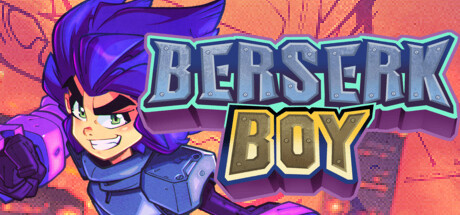Overview
Berserk Boy came out on March 6, 2024, bringing a fast, Metroidvania-style platforming adventure. Players step into the shoes of Kei, a rookie hero changed by mysterious Orb energy into the Berserk Boy. With powers over Lightning, Fire, Ice, Air, and Earth, Kei races through New Hope City and beyond to stop Dr. Genos and his Dark Energy army.
Storyline
The story is simple and fun: an evil scientist plans to enslave humanity, and a bright-eyed hero steps up to stop him. While the plot isn’t as deep as some indie hits, it’s perfect for players who just want to jump in, explore, and enjoy light banter between stages. Compared to story-heavy Metroidvanias like Hollow Knight or Ori and the Will of the Wisps, Berserk Boy keeps things lighter and focuses on action over deep storytelling.
Gameplay Mechanics
The game shines with its quick controls and smooth combo system. You chain attacks to fill your Berserk Meter, letting you unleash big, powerful moves that feel great to use. The five Orb forms give unique ways to play:
![]()
- Lightning: Quick attacks and chain dashes—perfect for speedrunners.
- Fire: Wide attacks that hit groups of enemies.
- Ice: Slows enemies and makes frozen platforms for clever movement.
- Air: Air combos and double-jumps for going higher.
- Earth: Heavy blows and shockwaves to smash through barriers.
With smooth jumping and Metroidvania-style backtracking, you’ll find hidden missions and collectibles. If you liked Dead Cells or Shovel Knight, Berserk Boy mixes intense combat with exploration in a way that feels fresh but familiar.
Visuals and Audio
The pixel art is vibrant and stylish, evoking a retro flair while incorporating modern animation polish. Enemy designs pop with personality, and each Orb transformation dazzles with color-coded effects. The soundtrack pairs catchy chiptune melodies with dynamic boss themes that ramp up the excitement. Compared to minimalist soundscapes in some modern Metroidvanias, Berserk Boy’s score is energetic and memorable.
![]()
Comparison with Genre Peers
- Vs. Hollow Knight: Berserk Boy leans more into combo-driven action, whereas Hollow Knight prioritizes atmosphere and deep lore.
- Vs. Ori and the Will of the Wisps: Ori dazzles with fluid platforming and emotional storytelling; Berserk Boy delivers faster combat and form-swapping mechanics.
- Vs. Dead Cells: Both games emphasize combos and high scores, but Dead Cells’ roguelike loops differ from Berserk Boy’s fixed world and upgrade paths.
- Vs. Shovel Knight: Shovel Knight’s tight level design and boss patterns are on par with Berserk Boy’s challenges, though Berserk Boy offers more ability variety.
User Reviews and Reception
With an 89% “Very Positive” rating from 274 Steam reviews, the community has embraced Berserk Boy’s energetic gameplay. Players praise:
- The addictive combo system and form-switching mechanics.
- Colorful pixel art and punchy soundtrack.
- Balanced difficulty that rewards skill without feeling unfair—mostly.
![]()
Common critiques include occasional difficulty spikes in late-game bosses and some backtracking that feels repetitive. Overall, the consensus is that Berserk Boy is a polished, action-packed platformer that scratches the itch for retro-styled Metroidvanias.
Overall Verdict
Berserk Boy stands out as a friendly, approachable action-platformer with enough depth to engage both casual players and hardcore speedrunners. While its story remains light, the tight controls, variety of Orb forms, and vibrant presentation make it a joy to explore. If you’re craving a modern take on retro pixel action—complete with satisfying combos, hidden secrets, and a cheering crowd of very positive players—Berserk Boy is well worth your time.

